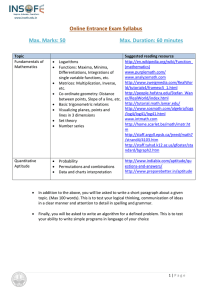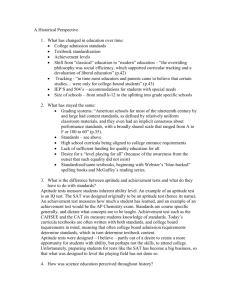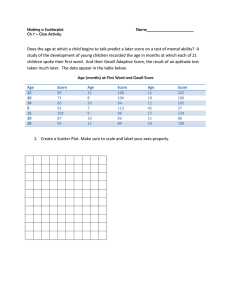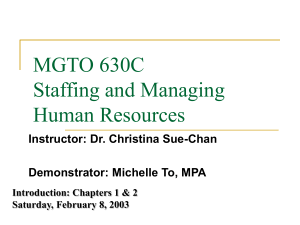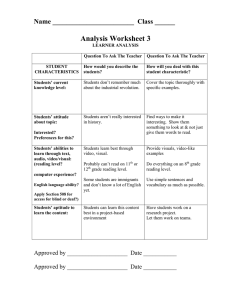Impact of Favourite Subject towards the Scientific Aptitude of the
advertisement
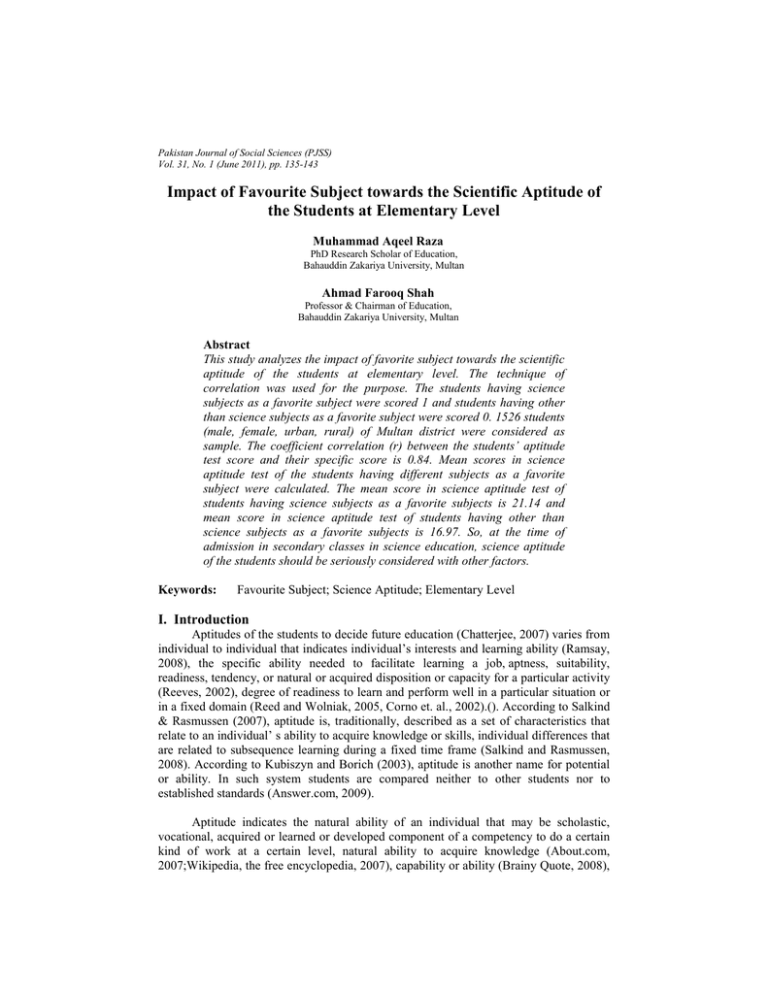
Pakistan Journal of Social Sciences (PJSS) Vol. 31, No. 1 (June 2011), pp. 135-143 Impact of Favourite Subject towards the Scientific Aptitude of the Students at Elementary Level Muhammad Aqeel Raza PhD Research Scholar of Education, Bahauddin Zakariya University, Multan Ahmad Farooq Shah Professor & Chairman of Education, Bahauddin Zakariya University, Multan Abstract This study analyzes the impact of favorite subject towards the scientific aptitude of the students at elementary level. The technique of correlation was used for the purpose. The students having science subjects as a favorite subject were scored 1 and students having other than science subjects as a favorite subject were scored 0. 1526 students (male, female, urban, rural) of Multan district were considered as sample. The coefficient correlation (r) between the students’ aptitude test score and their specific score is 0.84. Mean scores in science aptitude test of the students having different subjects as a favorite subject were calculated. The mean score in science aptitude test of students having science subjects as a favorite subjects is 21.14 and mean score in science aptitude test of students having other than science subjects as a favorite subjects is 16.97. So, at the time of admission in secondary classes in science education, science aptitude of the students should be seriously considered with other factors. Keywords: Favourite Subject; Science Aptitude; Elementary Level I. Introduction Aptitudes of the students to decide future education (Chatterjee, 2007) varies from individual to individual that indicates individual’s interests and learning ability (Ramsay, 2008), the specific ability needed to facilitate learning a job, aptness, suitability, readiness, tendency, or natural or acquired disposition or capacity for a particular activity (Reeves, 2002), degree of readiness to learn and perform well in a particular situation or in a fixed domain (Reed and Wolniak, 2005, Corno et. al., 2002).(). According to Salkind & Rasmussen (2007), aptitude is, traditionally, described as a set of characteristics that relate to an individual’ s ability to acquire knowledge or skills, individual differences that are related to subsequence learning during a fixed time frame (Salkind and Rasmussen, 2008). According to Kubiszyn and Borich (2003), aptitude is another name for potential or ability. In such system students are compared neither to other students nor to established standards (Answer.com, 2009). Aptitude indicates the natural ability of an individual that may be scholastic, vocational, acquired or learned or developed component of a competency to do a certain kind of work at a certain level, natural ability to acquire knowledge (About.com, 2007;Wikipedia, the free encyclopedia, 2007), capability or ability (Brainy Quote, 2008), 136 Pakistan Journal of Social Sciences Vol. 31, No. 1 innate or acquired capacity for learning (Merriam – Webster Online dictionary, 2008), readiness or quickness (The Free Dictionary, 2008) in learning, the state or quality of being apt (Accurate and Reliable Dictionary, 2008). The innate nature of aptitude is in contrast with achievement (Doctormassy.com, 2007) that represents knowledge or ability that is gained (Absolute Astronomy.Com, 2009). Aptitudes may be physical or mental. Aptitude and intelligence quotient have effects on one another positive or negative. Intelligence quotient considered intelligence the only measurable latent trait and aptitude divides mental ability into many different characteristics, which are independent to each other. A casual analysis of any group of test scores will prove the high correlation between aptitude and intelligence (Science Daily, 2008). There are two aspects of aptitude; first, the aptitudes are present conditions and inherence and environmental factors are not in the concept of aptitude. Aptitude cannot measure directly the future success of an individual but can be used as indicator of future success (Salkind & Rasmussen, 2007). Second, aptitude relates with the individual differences that is the combination of innate and environmental influences. Aptitude reflects current behaviors and tendency of learning. Learning includes cognitive abilities, personality traits, interests and values and all these can be considered aptitude and can be evaluated. Researches have proved that aptitude is the combination of heritable and environmental components and is unchangeable in normal circumstances. So Aptitude and situations are correlated (Salkind & Rasmussen, 2008). According to this conceptualization, specific cognitive skills, as well as specific forms of social and cultural capital constitute aptitudes (Bourdieu, 1986). But inborn characteristics have also impact on aptitude but it is described on present skills (Coleman, 1988). The concept of aptitudes has implications for practices like student grouping. The concept of aptitudes negates the concept of problem for slow learner and boring for high achiever. Given the proper situation, according to the aptitude, higher achieving students would be able to be role model and lower achieving students would be able to relearn and rethink. So, aptitude grouped the students heterogeneously, would require trust and respect from every student (Braddock II and Williams, 1996). Human capital theory and concept of aptitudes both have very different origins. Human capital theory explains investment decisions in higher education and on-the-job training. According to human capital theory is that education raises earnings (Becker, 1993). Human capital theory believes that decision-making for individual capacities should be based on economics while the concept of aptitudes is expressed in social context (Reed & Wolnaik, 2005). One of the most powerful implications of the concept of aptitudes is that every individual has equal opportunity to learn. For example, the concept of aptitudes empowers the use of OTL (Opportunity to learn) standards i.e. every individual has equal opportunity to learn according to his aptitude (Braddock II and Williams, 1996). Aptitude is used to predict future performance (Reeves, 2002) while achievement is a characteristic that is an indication of past instruction and experience that is planned changes in cognitive behavior (Haladyna, 2004) and ability is a measure of current competence Yesterday’s achievement is today’s ability and tomorrow’s aptitude (Assessment, 2008; About Intelligence, 2008). Aptitude is the potential to attain ability Muhammad Aqeel Raza, Ahmad Farooq Shah 137 and achievement is an improvement in ability (Salkind & Rasmussen, 2008). Aptitude is considered as synonymous with intelligence but aptitude has broader perspective (Salkind & Rasmussen, 2008). Aptitude enables a person to perform a task while attitude determines how well the person performs that task (Nobles and Thompson, 2001). A person, who has very good aptitude, may have failed because of his attitude (Yahoo Answers, 2008). One can train a person to have the aptitude but cannot train him to have the traits above or to have a positive attitude (Notowidigdo, 2007). An employee’s aptitude is often tested for the recruitment or selection but evaluation of attitude is necessary for selecting a suitable person (Nobles and Thompson, 2001). Aptitude and interest are often thought of as being equivalent but these are different concepts (Karmal & Karmal, 1978). Interest cannot be measured directly but it related to general intelligence and special aptitude and is determined by social environment and activities of an individual. Interest is not as consistent as a aptitude (Shahid et. al., 2003). Aptitude and interests are essential. Next are values. Personality encompasses some of interest and values. So, aptitude and interest have relation and have effect on each other. Both aptitude and interest are helpful in future educational and career decisions but are different terms (Career Vision, 2006). In term future education or career, no one can neglect the importance of science. Science helps students to apply varied set of skills (About Intelligence, 2008). Science aptitude is the potential for success in future in the field of science. An individual having science aptitude must enter in science or technical education otherwise he or she will not be successful in the field of science. Certain study skills, science and heredity background are helpful in determining science aptitude. Other factors like physical, social, emotional developments, moral character, interests, abilities and attitudes may also be considered for the development of science aptitude (Digumarti, 1994). Measurement of science aptitude is a challenge (Employment Equity & Diversity, 2005). Lord and Nicely (1997) worked on “Does spatial aptitude influence science-math subject preferences of children?” Similarly, the present study was conducted to analyze the impact of science subject towards science aptitude at elementary level II. Purpose of the Study A number of factors may affect the aptitude of an individual especially in young age and the present study aimed at analysing the “Impact of Favourite Subject towards the Scientific Aptitude of the Students at Elementary Level” The purpose of the study was to help the students and parents in decision making about the students entering science at secondary level while keeping their favourite subject in view. III. Population All students of class VIII of each sex of government high schools of District Multan (Punjab Province) were treated as population of the study. District is the further subdivision of four provinces of Pakistan. IV. Samples and Sample Size High schools of District Multan were selected randomly, considering the possible access of researcher but schools of each tehsil (Urban and rural as well as male and female) were included in sample. The students of class VIII of these schools were treated as sample of the study. Students of class VIII were selected by calling their roll numbers randomly (e. 138 Pakistan Journal of Social Sciences Vol. 31, No. 1 g. 1, 5, 6, 9, 20, 26 etc.). However, in the case of small number of students in the class, whole of the class was selected for the sample. The high schools of District Multan were randomly selected and then 1526 students of class VIII of each sex of these schools of were treated as sample of the study. To make population homogenous, the population was selected from Southern Punjab where there are 14 districts and same language is spoken almost in all areas (Lonely Planet, 2008; Mapsoft.Net, 2008). Similarly to make sample homogenous, students of class VIII between the age of 13 and 14 years were taken. V. Methodology This study was a part of PhD study conducted by Raza (2009) on topic “Standardization of an Aptitude Test in the subject of Science at Elementary Level.” To study the impact of favourite subject towards the scientific aptitude of the students at elementary level, the techniques of Correlation and Mean were used. The students were divided into two groups on the basis of their favourite subjects. The students having science subjects as a favourite subject were scored 1 and students having other than science subjects as a favourite subject were scored 0. The coefficient correlation (r) between the students’ aptitude test score and their specific score was calculated as given in Table 1: Table 1 Calculation of Coefficient Correlation (r) Sr. No. Favourite Subject No. of Students 1 Science & Mathematics Other than Science & Mathematics 642 884 2 Specific Score 1 0 Coefficient Correlation (r) 0.84 N = 1526 Table 1 shows that the coefficient correlation (r) between the students’ aptitude test score and their specific score is 0.84 The average of the score of different groups on Aptitude Test in the subject of Science at elementary level was calculated as given in Table 2: Table 2 Mean score on Science Aptitude Test of groups of students having Different favourite subjects Sr. No. Favourite Subject No. of Students Mean Score 1 2 3 4 5 6 N = 1526 Science Mathematics English Urdu Social Studies Islamic Studies 348 294 189 374 74 247 20.96 21.35 17.44 16.94 17.23 16.57 Table 2 shows that the mean of science aptitude scores of students having different subjects as a favourite subject. Mean score in science aptitude test of students having Mathematics, as a favourite subject is highest (21.35) as shown in graph 1. Muhammad Aqeel Raza, Ahmad Farooq Shah 139 Graph 1: Mean score on Science Aptitude Test of groups of students having different favourite subjects 25 Mean Score 20 15 10 5 0 ScienceMathematics English Urdu Subjects Social Studies Islamic Studies Graph1 shows that the mean of science aptitude scores of students having different subjects as a favourite subject. Table 3 Mean of Students’ Science Aptitude Score having favourite science Subjects and other than science subjects Sr. No. 1 2 Favourite Subject Science & Mathematics Other than Science Mathematics & No. of Students 642 884 Mean Score 21.14 16.97 N = 4768 Table 3 shows that the mean score in science aptitude test of students having one of the science subjects as a favourite subject is 21.14 and mean score in science aptitude score of students having other than science subjects as a favourite subject is 16.97 as shown in graph 2. Graph 2: Mean Score of Students in Science Aptitude Test having favourite science subjects and other than science subjects Mean Score 25 20 15 10 5 0 Science & Mathematics Other than Science & Subjects Mathematics Graph 2 shows that the mean score in science aptitude test of students having one of the science subjects as a favourite subject is 21.14 and mean score in science aptitude score of students having other than science subjects as a favourite subject is 16.97. 140 Pakistan Journal of Social Sciences Vol. 31, No. 1 VI. Findings i. ii. iii. Table 1 shows that the coefficient correlation (r) between the students’ aptitude test score and their specific score is 0.84. Table 2 shows that the mean score in science aptitude test of students having Science, Mathematics, English, Urdu, Social Studied and Islamic Studies are 20.96, 21.35, 17.44, 16.94, 17.23 and 16.57 respectively. Table 3 shows that the mean score in science aptitude test of students having one of the science subjects as a favourite subject is 21.14 and mean score in science aptitude score of students having other than science subjects as a favourite subject is 16.97. VII. Conclusions i. ii. iii. iv. In term of magnitude, a positive magnitude indicates that with the increase of one score, other also increases. Students with having science subjects as a favourite subject have more score in science aptitude test than the score of students other than science subject as a favourite subject. For strength, the correlation coefficient 0.84 shows the high relationship. It supports the statement that students having science subjects as a favourite subjects have more scientific aptitude than the students having favourite subject other than science subjects. Mean scores in science aptitude test of students having Science, Mathematics, are 20.96, 21.35 respectively. These mean scores are greater than all other mean scores in science aptitude test of students having favourite subjects other than science subjects. It supports the statement that students having science subjects as a favourite subjects have more scientific aptitude than the students having favourite subject other than science subjects. High mean of the students having science subjects as a favorite subject shows high science aptitude than students having other than science subjects as a favorite subject All of three aspects tested in methodology supports the statement that students having science subjects as a favourite subject have more scientific aptitude than the students having favourite subject other than science subjects. VIII. Recommendations i. ii. iii. iv. There is positive magnitude and high relationship between students’ aptitude test score and their specific score. So, at the time of admission in secondary classes in science education, favorite subjects of the students should be seriously considered with other factors. Aptitude must be tested at the time of admission at secondary level education and students must be guide to choose subjects according to their aptitude. High mean of the students having science subjects as a favorite subject shows high science aptitude than students having other than the science subjects as a favorite subject. So students having science subjects as favorite subject have high science aptitude may allow entering science education at secondary level. Students having no science aptitude may not be allowed entering science education at secondary level. Otherwise students will not show better performance in science education. This may harmful of the career of the student. Muhammad Aqeel Raza, Ahmad Farooq Shah 141 References About.com (2007). Aptitude Retrieved on December http://ergonomics.about.com/od/glossary/g/aptitude.htm 14, 2007 from About Intelligence (2008). Aptitude VS Intelligence. Retrieved on June 21, 2008 from http://www.aboutintelligence.co.uk/aptitude-intelligence.html Absolute Astronomy Com (2009). Retrieved on January http://www.absoluteastronomy.com/topics/Aptitude 9, 2009 from Accurate and Reliable Dictionary (2008), Aptitude. Retrieved on February 17, 2008 from http://ardictionary.com/Aptitude/7990 Answer.com (2009). Aptitude. Retrieved http://www.answers.com/topic/aptitude on March 15, 2009 from Assessment (2008). Aptitude, Ability & Achievement. Retrieved on March 25, 2008 from http://bondessays.carnegiefoundation.org/?p=6 Becker, G. S. (1993). Human Capital: A Theoretical and Empirical Analysis with Special Reference to Education. 3rd Ed., Chicago: The University of Chicago Press. Blerkom, M. L. V. (2009). Measurement and Statistics for Teachers, New York: Routledge. Bourdieu, P. (1986). The Handbook of Theory and Research for the Sociology of Education, New York: Greenwood Press. Braddock II, J. H. and Williams, M. M. (1996). Implementing Educational Reform: Sociological Perspectives on Educational Policy, Norwood, NJ: Ablex. Brainy Quote (2008). Aptitude. Retrieved on January 12, http://www.brainyquote.com/words/ap/aptitude131806.html Career Vision (2006). Retrieved on March http://www.careervision.org/Consulting/FAQs.htm 16, 2008 2007 from from Chatterjee, A. (2007). A Controlled and Effective Education System for a country. Retrieved on February 24, 2008 from http://www.indian studentresearch.blogspot.com/2007/11/controlled-andeffectiveeduca tion.html Coleman, J. S. (1988). Social Capital in the Creation of Human Capital. American Journal of Sociology, 94, 95-120. Snow, R. E., Corno, L. and Cronbach, L. (2002). Remaking the Concept of Aptitude, Snow: Lawrence Erlbaum Associates. 142 Pakistan Journal of Social Sciences Vol. 31, No. 1 Digumarti, B. R. (1994). Scientific Aptitude, New Delhi: Ashish Publishing House. Doctormassy.com, (2007). Retrieved on Doctormassey.com/glossary.html February 12, 2007 from www. Employment Equity and Diversity, (2005). Aptitude Measures. Retrieved on June 4, 2005 from http://www.psc-cfp.gc.ca/ee/eecco/aptitude_e.htm Haladyna, T. M. (2004). Developing and Validating Multiple-Choice Tests Items, 3rd Ed., London: Lawrance Erlbum Associates, Publishers. Karmal L. J. and Karmal, M. O. (1978). Measurement and Evaluation in the School, 2nd Ed., New York: Macmillan Pulishing Co. Inc. Kline, P. (1986). A Handbook of Test Construction, New York: Methuen & co. Loewenthal, K. M. (2003). An Introduction to Psychological Tests and Scales, 2nd ed., Kundli: Psychology Press Ltd. Lonely Planet (2008). Southern Punjab. Retrieved on January 10, 2008 from http://www.lonelyplanet.com/pakistan/punjab/southern-punjab Lord, T. and Nicely, G. (1997). Does spatial aptitude influence science-math subject preferences of children? From Journal of Elementary Science Education. Retrieved on May 25, 2010 from http://www.springerlink. com/ content/h25x682366q31214/ Kubiszyn, T. and Borich, G. (2003). Educational Testing and Measurement, 7th ed., Singapore: John Wiley & Sons, Inc. Magno, C. and Ouano, J. (2009). Designing the Written Assessment of Student Learning, Manila: De La Salle University. Mapsoft.Net (2008). Retrieved on January 13, 2008 from http://mapsof.net /N%C4%81 rang_(Southern_Punjab) Merriam – Webster Online Dictionary, (2008). Aptitude. Retrieved on May 25, 2008 from http://www.merriam-webster.com/dictionary/aptitude Nobles, H. and Thompson, C. (2001). Attitude Vs Aptitude. Retrieved on March 29, 2008 from http://www.hotelonline.com/News/ PR2001_2nd/Jun01 Attitude Aptitude.html Notowidigdo, P. (2007). Retrieved on December 7, 2007 from http://www. indoindians.com/writer/attitude.htm Ramsay, T. (2008). Advantages of Multiple Choice Aptitude Tests. Retrieved on May 25, 2008 from http://www.ramsaycorp .com/categories/aptitude.asp Muhammad Aqeel Raza, Ahmad Farooq Shah 143 Reed, E. J. and Wolniak, G. C. (2005). Concept of Aptitude. , Retrieved on February 23, 2007 from http://www.sociology.org/content/2005/tier1/reed_wolniak.pdf Reeves, J. F. (2002). Aptitude Assessment. Retrieved on January 15, 2005 from http://www.theworksuite.com/id15.html Salkind, N. J. and Rasmussen, K. (2007). Encyclopaedia of Measurement and Statistics. 1, London: SAGE Publications, Inc. Salkind, N. J. and Rasmussen, K. (2008). Encyclopaedia of Educational Psychology. 1, London: SAGE Publications, Inc. ScienceDaily, (2008). Aptitude. Retrieved on May http://www.sciencedaily.com/ articles/a/aptitude.htm 5, 2008 from Shahid, S. M. et.al. (2003). Educational Measurement & Evaluation, Islamabad: Department of Teacher Education, Allama Iqbal Open University. Wikipedia the free encyclopedia (2007). Aptitude. Retrieved on November 2, 2007 from http://en.wikipedia.org/wiki/Aptitude Yahoo Answers (2008). Retrieved on March 25, 2008 from http://answers .yahoo.com/question/index?qid=20090206004851AAtsJiX
